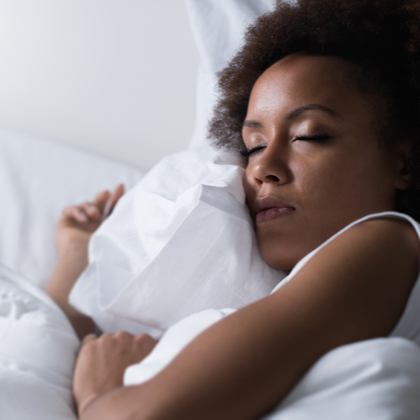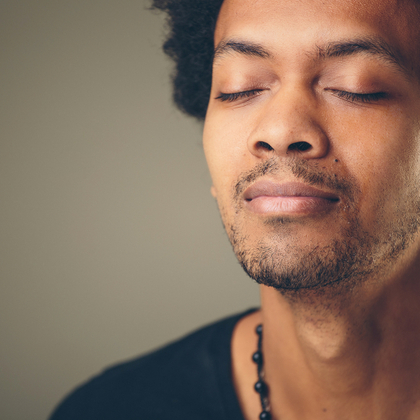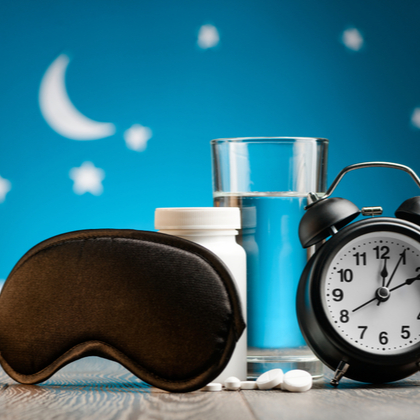
Characterised by feelings of persistent hopelessness, sadness, and a loss of interest in activities, depression can be a tiresome and wearing condition, especially since it almost always affects sleep.
Both insomnia (the inability to fall asleep and stay asleep) and hypersomnia (oversleeping) are common symptoms of depression, so much so that doctors will routinely discuss sleep patterns as part of their diagnosis 1.
What makes depression and sleep problems so complex is that they often have a bidirectional relationship2. This means that poor sleep can exacerbate or even lead to depression, and depression can contribute to or cause sleep issues.

Fortunately, with simple lifestyle changes and plenty of support, you can manage depression and improve the quality of your sleep. Understanding the link between sleep and mental health is an important first step to support your sleep hygiene and emotional wellbeing.
What are some symptoms of depression?
Like any mental health disorder, the severity of depression varies from person to person, but the most common symptoms include3:
-
Feelings of sadness, hopelessness, or despair
-
Lower energy
-
Lower libido
-
Frequent or occasional thoughts of death or suicide
-
Reduced self-esteem
-
Weight gain or loss
-
Loss of interest in activities you formerly enjoyed
-
Insomnia
-
Excessive daytime sleepiness
How does sleep affect your mental health?
If you’ve ever experienced a bad night’s sleep, you know how much it can affect your mood the next day. Evidence suggests that nocturnal brain activity significantly affects cognitive, emotional, and mental health3.
During sleep, particularly rapid-eye-movement (REM) sleep - the stage in which we dream - the emotional networks of our brain are being recalibrated and retuned. REM sleep dreaming provides overnight mental health therapy. It acts as a nocturnal soothing balm that processes the day’s happenings, taking the sharp edges off difficult emotional content and concerns. In short, REM sleep provides vital emotional convalescence.
Research reports that sleep deprivation increases the activity of the amygdala, the brain’s fear centre, which controls our emotional reactions4. Without enough sleep, our amygdala goes into overdrive and makes us feel more emotionally reactive.
Chronic sleep deprivation can have serious long-term consequences and is often associated with poor mental health outcomes, such as anxiety, depression, and suicidal ideation5.
In a clinical study conducted by sleep experts at The University of California, researchers reported that when healthy participants were kept awake for 24 hours, they experienced much higher anxiety the following morning than they did after a full night’s sleep6.
Lack of sleep and depression: what’s the link?
Insomnia
Increasingly, the traditional view that sleep problems are symptomatic of depression is being called into question. What appears to be more compelling is that depression and sleep disturbances mutually reinforce each other and operate in a vicious cycle; sleep issues can be both the cause and consequence of depression7. This can make it hard to identify which came first: the depression or the sleep disruptions.
Both depression and sleep problems also involve hormone imbalances and changes in the function of the neurotransmitter serotonin, which affect mood and sleep quality8.
People with depression commonly experience insomnia, with many struggling to fall asleep, waking up several times during the night, and feeling tired during the day.
If you experience insomnia alongside depression, it’s worth trying a range of natural treatments to help manage your symptoms.
Depression and oversleeping: what’s the link?
Hypersomnia
As well as getting too little sleep, depression can also have the opposite effect, leading to hypersomnia (oversleeping) 9. Hypersomnia contribute to yet another negative feedback loop since the very act of lying in a dark room can disrupt your circadian rhythm, also known as your internal body clock.
Light and darkness are two critical signals for your body’s circadian rhythm: daylight cues activity and the release of serotonin, while darkness signals rest and the secretion of your sleep hormone, melatonin. Oversleeping, therefore, often worsens feelings of depression and fatigue.
It’s worth mentioning, however, that depression isn’t the sole cause of hypersomnia. Many factors may contribute to oversleeping, which you can read about here.
Managing depression and sleep problems
For some time now, it’s been suggested improving sleep may prevent or treat depression – and vice versa. Here are some of the best ways to break the bidirectional relationship.
Keep a regular sleep-wake routine
Navigating depression and sleep disturbances can make it hard to plan and schedule your life. And yet, sticking to a consistent routine is one of the best ways to support your sleep hygiene and mood. Try to go to bed and wake up at the same time every day.
Additionally, give yourself a generous sleep opportunity window (enough time to get your minimum amount of sleep). Since most people have a sleep efficiency of 85%, this means you’ll need to be in bed around 8 hours 13 minutes if you want a minimum of 7 hours sleep each night.
Following the same wind-down rituals every night will further prepare your body for rest. Why not try these 6 mindfulness techniques which have the added bonus of supporting your mood?
Get enough morning light
One of the best ways to support your sleep hygiene and overall mood is getting plenty of natural sunlight in the morning, even if it’s grey and overcast. Exposure to morning sunlight is a vital component of our evolutionary heritage; it regulates our circadian rhythm and promotes high-quality sleep at night.
Decreased sun exposure has also been linked to low serotonin levels, which can affect your overall wellbeing and even lead to seasonal affective disorder (SAD), characterised by low mood10. During the darker winter months, you may wish to invest in a lightbox that mimics natural sunlight.
If you want to embark on an exercise regime, aim to have finished your workout by 7pm, as late-night physical activity may disrupt sleep.
Move more
Of course, an excellent way to get more sunlight is exercising outside. Not only does regular physical activity reduce the time it takes to fall asleep (sleep onset), but it also releases feel-good endorphins that support your emotional health. For some people, exercise can serve as natural anti-depressant11. Even 10-15 minutes of low-intensity exercise can help.
Get support
Struggling with depression and sleep problems can be isolating and debilitating. But we hope that it can bring you some comfort knowing you’re not alone. Always reach out for support if you need it. Talk to friends, loved ones, your GP, or a professional therapist. There’s plenty of help out there.
Although depression and sleep disturbances often operate in a negative feedback loop, rest assured, you can break the cycle with the right lifestyle changes and support. For more guidance on how to sleep soundly, please explore the rest of our Sleep Health Hub.
References:
- Jindal RD, Thase ME. (2004) Treatment of insomnia associated with clinical depression. Sleep Med Rev. 8(1): 19-30.
- Franzen PL, Buysse DJ. (2008) Sleep disturbances and depression: risk relationships for subsequent depression and therapeutic implications. Dialogues Clin Neurosci. 10 (4): 473-81.
- Maquet P. (2000) Sleep on it! Nat Neurosci. (12): 1235-6.
- Yoo, S., Gujar, N., Hu, P., Jolesz, F. and Walker, M., 2007. The human emotional brain without sleep — a prefrontal amygdala disconnect. Current Biology, 17(20), R877-R878.
- Bernert RA, Kim JS, Iwata NG, Perlis ML. (2015) Sleep disturbances as an evidence-based suicide risk factor. Curr Psychiatry Rep. 17(3: 554.
- 2021. Sleep-deprived and anxious? This brain region helps to explain why. [ONLINE] Nature.com. Available at: https://www.nature.com/articles/d41586-019-03380-z
- Franzen PL, Buysse DJ. (2008) Sleep disturbances and depression: risk relationships for subsequent depression and therapeutic implications. Dialogues Clin Neurosci. 10(4): 473-81.
- Daut RA, Fonken LK. (2019) Circadian regulation of depression: A role for serotonin. Front Neuroendocrinol. 54: 100746.
- Dauvilliers, Y., Lopez, R., Ohayon, M., & Bayard, S. (2013). Hypersomnia and depressive symptoms: methodological and clinical aspects. BMC medicine, 11, 78.
- Mayo Clinic. 2021. Seasonal affective disorder (SAD) - Symptoms and causes. [ONLINE] Available at: https://www.mayoclinic.org/diseases-conditions/seasonal-affective-disorder/symptoms-causes/syc-20364651
- Schuch FB, Vancampfort D, Richards J, Rosenbaum S, Ward PB, Stubbs B. (2016) Exercise as a treatment for depression: A meta-analysis adjusting for publication bias. J Psychiatr Res.77: 42-51

Olivia
Olivia Salter has always been an avid health nut. After graduating from the University of Bristol, she began working for a nutritional consultancy where she discovered her passion for all things wellness-related. There, she executed much of the company’s content marketing strategy and found her niche in health writing, publishing articles in Women’s Health, Mind Body Green, Thrive and Psychologies.
View More



